Patsy Trench's Blog, page 4
January 7, 2022
Violet Frogg is free!
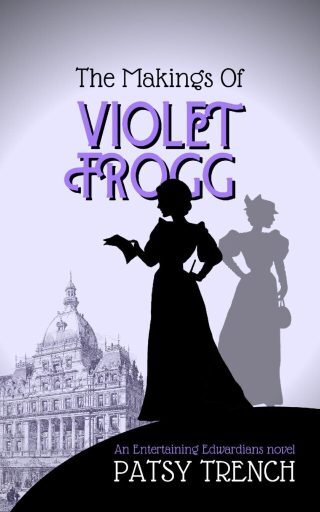
In ebook Kindle version on Amazon until 12 January 2022. Available HERE.
© Patsy Trench
The post Violet Frogg is free! appeared first on .
December 30, 2021
Publication day!
MRS MORPHETT’S MACAROONS is published today.

Available as an ebook and paperback on Amazon. The Book Depository,
Waterstone’s, Barnes & Noble, Booktopia & Angus & Robertson
© Patsy Trench
30 December 2021
The post Publication day! appeared first on .
November 29, 2021
The Makings of Violet Frogg
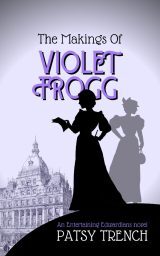
All the world’s a stage,
And all the men and women merely players.
They have their exits and their entrances,
And one man in his time plays many parts.
As You Like It, Act II Scene VII
Violet Frogg, the woman with many lives and many names.
Born Frogg to a straitlaced vicar and his wife, at the first opportunity Violet escapes the family home to become Violet Turnip – wife to a civil servant living in four-storey luxury in Bloomsbury.
When that goes awry, Mrs Turnip becomes Mrs Graham, assistant to the acting manager with Herbert Tree’s theatre company. As an independent working woman Violet at last feels content. But life has other plans – another move, another position, another name and yet another identity.
What is Violet escaping from? How hard can it be for a woman to lead an independent life in the last decades of the 19th century?
The post The Makings of Violet Frogg appeared first on .
October 22, 2021
The modern lady milliner
An extract from my forthcoming novel ‘Mrs Morphett’s Macaroons’, as performed by the redoubtable duo, Merry and Gaye. With apologies to W S Gilbert (and Sir Arthur Sullivan).
It celebrates the glorious OTT fashion for hats in Edwardian England. (And the fact that one of my characters is a milliner.)

MERRY:
I am the very model of a modern lady milliner,
I own a little hat shop off the Strand – you may have been in there.
My clients are exclusively the cream of our society,
I’m known for my discretion and my taste and my propriety.
I know the latest fashion and I’d say that I’m ahead of it,
You’ll never find a hat that’s out of style, I just get rid of it,
I’ve simple hats and fancy hats with trimmings and with featherers,
I’ve hats for all occasions and for every kind of weatherers.
GAYE: (accompanying the words of the chorus with a strange little bobbing motion)
She’s hats for all occasions and for every kind of weatherers,
She’s hats for all occasions and for every kind of weatherers,
She’s hats for all occasions and for every kind of weather-weather-ers.’
MERRY:
Each model is unique, you will find there’s only one of it,
Fads and mass production, I’ll have absolutely none of it,
No Merry Widow nonsense and no passing whims or silliness,
For I’m the very model of a modern lady millin’ress.
GAYE: (chorus)
No Merry Widow nonsense and no passing whims or silliness,
For she’s the very model of a modern lady millin’ress.



MERRY:
I’ve curly brims and floppy brims and hats completely brimless.
Panamas with ribbons on, irregular or rimless,
I’ve Buckets, I have Cartwheels, I have Gainsboroughs with flowers on,
Tricorns, tam o’shanters, and a cloche with Eiffel Towers on.
Wedding hats and party hats, Derby hats and toques,
I’ve hats from off the shelf, made to measure and bespoke,
I’ve bretons and I’ve turbans, on the straight or asymmetrical,
Berets plain or stripy or with patterns diametrical.
GAYE:(chorus)
Berets plain or stripy or with patterns diametrical,
Berets plain or stripy or with patterns diametrical,
Berets plain or stripy or with patterns diametri-metrical.
(The tempo of the music slows)
MERRY:
Each bonnet is a statement, every beret tells a story,
A hat is so much more than just a mere accessosory,
I’ve sober hats and jaunty hats, for fun’rals or festivities,
Hats for servants, mistresses, and maids of all proclivities.
There are hats to make a maiden swoon, hats to dance a reel in,
Picture hats to hide beneath or cloches all-revealing,
Boaters that will guide you in your speech and your behaviour,
Yes, a hat can be your dearest friend, a hat can be your saviour.
GAYE: (chorus)
A hat can be your dearest friend, a hat can be your saviour.
A hat can be your dearest friend, a hat can be your saviour.
A hat can be your dearest friend, a hat can be your saviour-saviour-er.
MERRY:
From the promenades of Paris to the salons of Sofia,
You’ll find my darlings perched on every noble head you see-a,
In halls of fame throughout the world my name is all-familiar,
I am the very model of a modern lady milliner.
GAYE: (chorus)
In halls of fame throughout the world her name is all-familiar,
She is the very model of a modern lady milliner.
(Images from Pixabay.com)
© Patsy Trench
The post The modern lady milliner appeared first on .
July 13, 2021
Becoming a grandmother
My maternal instinct was absent before and during the whole of my pregnancy until my firstborn appeared, at which time it kicked in with a wallop, like a bolt of lightning. This I assumed was nature at work, and at her best. I had no particular preconceptions, literally, I became pregnant initially mostly out of curiosity. I had a freelance career and a life into which a baby did not fit without some upheaval. But it’s not an exaggeration to say I did not feel I had fully lived until that tiny, yelling creature entered my world.
And now I am a grandma.It’s been a long long wait, during which my daughter spent the best part of her childbearing years with a partner who did not want children and I had all but given up hope. Little Billy (not his real name) entered this world at the end of March 2021, during semi-lockdown. My daughter was 41 at the time and had a completely uneventful pregnancy which was closely monitored, so there were no reasons for worry. But worry is a part of childbirth, far more I discovered when you’re a grandma than a mother. Will it – the gender was unknown until the birth – be okay? Will it develop normally? Fingers, toes, eyes, hearing?
 The Burrito (so-called by his mum), aged 2 days
The Burrito (so-called by his mum), aged 2 daysBilly was a largeish baby, delivered a few days early by C-section. For a worrying few weeks he barely opened his eyes. Worrying for the grandma, that is, not for the mother or father. He fed well. He grew, slowly. He began to open his eyes, and then to focus. Then after around three months the first glimmerings of a smile – not always distinguishable from wind, of course. Now he fixes you with an unblinking stare that appears to delve into the depths of your soul. Babies do not blink much, apparently. What is happening inside that small brain heaven only knows, but there is certainly something.
I have been the good grandma and offered support but not advice.It is not hard to do. If a baby has two parents who love and cherish him as Billy does there is nothing to be advised. My mother would disagree. In her view a baby can be ‘spoiled’ from the moment it emerges from the womb. It can also be bullied, and neglected, and I have no doubt at all which is worse.
 And grandma
And grandmaOf course he is beautiful, as are his parents. But what is astonishing is the almost overwhelming feeling of love that has taken over his grandma. His ageing grandma, whose life truly began with childbirth and is now undergoing whole new experiences in her late seventies. What is that about? I am not particularly a baby or small person sort of woman. I don’t go out of my way to chat or play with other people’s little ones, like so many of my friends do. I would never allow myself to rely on a grandchild to transform my life. But this small creature, this small, fierce, occasionally ear-splittingly noisy creature, has taken hold of my heart and is hanging on with his tiny, powerful fingers.
Ain’t nature wonderful?Patsy Trench
July 2021
The post Becoming a grandmother appeared first on .
July 4, 2021
Failure and success: in praise of the long-term persister
I once tried to sell the idea to a newspaper of a series of articles under the title ‘Long-term failures’.
It was intended as the antidote to the notion of the ‘overnight success’: the author whose debut novel had won the Booker Prize, notwithstanding the fact that this was his twenty-fifth novel and it had already been turned down by thirty-nine publishers. Or the actress who was starring in her first film having spent the previous twenty-odd years working steadily if anonymously in theatre and television.
Needless to say no newspaper took up my offer. I suspect it was the title that did it. No one really wants to read about failure, do they?
I was reminded of this while working on my book ‘Theatrical Women’. It’s a random collection of bits of pieces gleaned from my researches into the actors and actresses of Edwardian theatre.
It’s easy enough to find books written about the Greats, such as Ellen Terry or Herbert Tree or Mrs Patrick Campbell. But I really wanted to hear about the people who didn’t make it for one reason or another, or who never reached what we call the big time.
I eventually managed to lay my hands on a few memoirs written by people such as Jerome K Jerome – yes, he had a brief and little-known career as an actor – George Arliss (who did make it), Robert Courtneidge (father of Cicily), Joe Graham, Gertrude Kingston and various others, all describing their early struggles to make a life on the stage. And as I was reading I couldn’t help thinking –
Aren’t stories about failure that much more interesting than tales of success?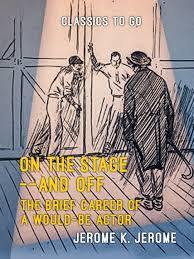
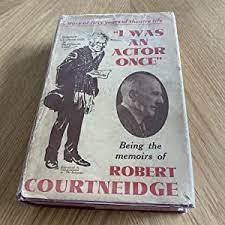
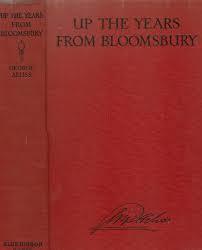 Images Gutenberg (Jerome), Abe Books and British Library
Images Gutenberg (Jerome), Abe Books and British LibraryAdmittedly it was the disasters that particularly intrigued me. The ‘sham’ agents who charged the would-be actor a fortune in return for the promise of a part on the West End, and then vanished. The tour managers who vamoosed at the end of the week with the takings, sometimes having to escape through a window when the actors locked him in his room. The actors who had to walk twenty miles between gigs because their salaries did not cover train tickets. Or who slept under bridges because no landlady wanted a bar of them. (Often understandably: either they drank away the week’s takings in lieu of rent, or they were victims of the unscrupulous or inefficient manager who couldn’t afford to pay them in the first place.) The elderly – usually -actors who set themselves up as elocution and acting teachers and, as George Arliss remarked, taught their students to speak in a manner never heard before on stage or off.
Of course those are not so much failures as struggles, the sort of obstacles every young person encounters early in her or his career, only worse, much worse. The point is these people persisted, despite starvation, humiliation, rejection and near destitution, and while some of them went on to better things many of them did not.
But isn’t there something fascinating, and heartening, about the person who persists? Who is still trying to pass his driving test after a dozen failures? Who still participates in athletic competitions even when they are past their best? Who is still determined to find a distributor for their film after thirty years of trying?
I don’t find these people pathetic, far from it. In many senses I regard myself as one of them. Persistence, no matter what profession you pursue, is not just a virtue, it’s a necessity. I once met a film producer whom I won’t name who achieved huge success despite in my view having no talent whatsoever. When I got to observe him working I realise what he lacked he made up for, several times over, with persistence. He would not take no for an answer.
So here’s to all the long-term persisters – I won’t call them failures. It takes guts to be a persister, and a certain self-belief that is entirely endearing. Not to mention the huge lessons we learn, and keep on learning, along the way.
May we rejoice in never achieving our goals.
The post Failure and success: in praise of the long-term persister appeared first on .
Failure and success: in praise of the long-term persistor
I once tried to sell the idea to a newspaper of a series of articles under the title ‘Long-term failures’.
It was intended as the antidote to the notion of the ‘overnight success’: the author whose debut novel had won the Booker Prize, notwithstanding the fact that this was his twenty-fifth novel and it had already been turned down by thirty-nine publishers. Or the actress who was starring in her first film having spent the previous twenty-odd years working steadily if anonymously in theatre and television.
Needless to say no newspaper took up my offer. I suspect it was the title that did it. No one really wants to read about failure, do they?
I was reminded of this while working on my book ‘Theatrical Women’. It’s a random collection of bits of pieces gleaned from my researches into the actors and actresses of Edwardian theatre.
It’s easy enough to find books written about the Greats, such as Ellen Terry or Herbert Tree or Mrs Patrick Campbell. But I really wanted to hear about the people who didn’t make it for one reason or another, or who never reached what we call the big time.
I eventually managed to lay my hands on a few memoirs written by people such as Jerome K Jerome – yes, he had a brief and little-known career as an actor – George Arliss (who did make it), Robert Courtneidge (father of Cicily), Joe Graham, Gertrude Kingston and various others, all describing their early struggles to make a life on the stage. And as I was reading I couldn’t help thinking –
Aren’t stories about failure that much more interesting than tales of success?


 Images Gutenberg (Jerome), Abe Books and British Library
Images Gutenberg (Jerome), Abe Books and British LibraryAdmittedly it was the disasters that particularly intrigued me. The ‘sham’ agents who charged the would-be actor a fortune in return for the promise of a part on the West End, and then vanished. The tour managers who vamoosed at the end of the week with the takings, sometimes having to escape through a window when the actors locked him in his room. The actors who had to walk twenty miles between gigs because their salaries did not cover train tickets. Or who slept under bridges because no landlady wanted a bar of them. (Often understandably: either they drank away the week’s takings in lieu of rent, or they were victims of the unscrupulous or inefficient manager who couldn’t afford to pay them in the first place.) The elderly (usually) actors who set themselves up as elocution and acting teachers and, as George Arliss remarked, taught their students to speak in a manner never heard before on stage or off.
Of course those are not so much failures as struggles, the sort of obstacles every young person encounters early in her or his career, only worse, much worse. The point is these people persisted, despite starvation, humiliation, rejection and near destitution, and while some of them went on to better things many of them did not.
But isn’t there something fascinating, and heartening, about the person who persists? Who is still trying to pass his driving test after a dozen failures? Who still participates in athletic competitions even when they are past their best? Who is still determined to find a distributor for their film after thirty years of trying?
I don’t find these people pathetic, far from it. In many senses I regard myself as one of them. Persistence, no matter what profession you pursue, is not just a virtue, it’s a necessity. I once met a film producer whom I won’t name who achieved huge success despite in my view having no talent whatsoever. When I got to observe him working I realise what he lacked he made up for, several times over, with persistence. He would not take no for an answer.
So here’s to all the long-term persisters – I won’t call them failures. It takes guts to be a persister, and a certain self-belief that is entirely endearing. May we rejoice in never achieving our goals.
The post Failure and success: in praise of the long-term persistor appeared first on .
May 11, 2021
In praise of Nancy Mitford
This is spot on. Despite the fact she was writing nearly a century ago, and about that unfashionable species known as the Upper Classes, her prose is so light, and so witty, it is easy to forget she is writing often about tragic – or worse, apparently trivial – matters.
The Radlett family that features in her novel The Pursuit of Love (currently on BBC 1 on Sunday nights) is dysfunctional to its core, thanks to tyrannical, xenophobic Uncle Matthew (played with great gusto by Dominic West). He uses his children as hunting prey and abuses them, in public or otherwise, at any given opportunity. He rages about ‘huns’ and ‘wogs’ and refuses to allow any of his children to be educated. He humiliates his niece Fanny – the narrator of the book, the only one of her cousins to receive a proper education – with dogged relentlessness. If this was a modern-day family he’d have been locked up years ago and his children taken into care.
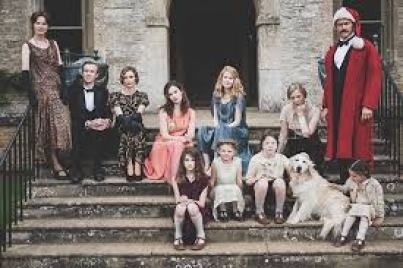 (radiotimes.com)
(radiotimes.com)The dysfunctional Radlett family, with Uncle Matthew (Dominic West) as Father Christmas, Fanny (Emily Beecham) top step centre and Linda Radlett (Lily James) on her right
The Pursuit of Love on the surface is about the desperate desire of the central character Linda Radlett, Fanny’s cousin, to fall in love and to marry. But the book is a long long way from a romantic novel. The apparent triviality of the central theme is an example of the sort of empty, purposeless lives so many young women were forced to lead back in the earlier part of the twentieth century, when very few of them were expected, or given the opportunity, to make a career or lead any kind of independent life.
Ms Mitford’s determined lack of sentimentality at times comes across as harsh, even shocking, especially when it comes to childbirth. But what also strikes me about her is the economy of her writing. It is this economy and lightness of touch that above all I have tried to emulate in my own novels, and some reviewers have, most gratifyingly, picked up on this. My favourite kind of review is along the lines of ‘a partly tragic story told with wit and a lightness of touch’. Just the sort of thing one might say about Nancy Mitford, if I may be so bold and arrogant as to mention myself in the same paragraph as her.
The Pursuit of Love, adapted and directed by Emily Mortimer, is currently screening in three parts on BBC 1. In celebration of this I have reduced the price of Claudia for the duration of the series to 0.99c (0.99p).
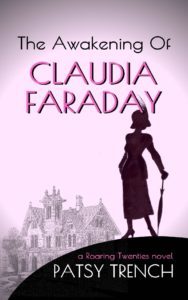 Claudia
Claudia © Patsy Trench
London 2021
The post In praise of Nancy Mitford appeared first on .
March 27, 2021
Publication day!
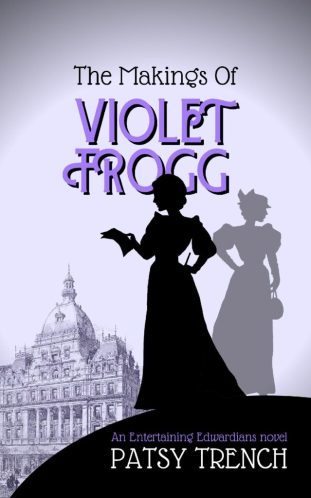 Book 1 in my Entertaining Edwardians series
Book 1 in my Entertaining Edwardians seriesWelcome to Violet Frogg, vicar’s daughter, socialite wife, working woman, suffragist and housekeeper.
A woman who leads many lives under many names and many identities, and all in the cause of . . .
Of what exactly?
Read the book to find out!
Available from 27 March on Amazon,Book Depository, Booktopia, & to order from
Waterstones
© Patsy Trench
London
The post Publication day! appeared first on .
March 16, 2021
What is an erotic novel?
The obvious answer is it’s a book in which sex is the central focus and is described graphically. In other words it is aimed at the reader who likes to read about people having sex.
But what is the difference between an erotic novel and novel that’s about sex?
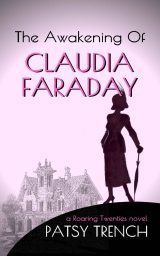
It’s a question that comes up again and again in my case. My first novel in The Roaring Twenties series is about a fifty-something woman and mother of three who discovers the joys of sex for the first time.
Claudia is a typical product of her time: born in straitlaced Victorian Britain and brought up to consider sex as a duty rather than a pleasure (like homework), and for the purpose of pro-creation only. So the discovery, partly thanks to Marie Stopes, that it can be indulged in for its own sake, and be immensely pleasurable, comes as an overwhelming surprise to Claudia in her middle age.
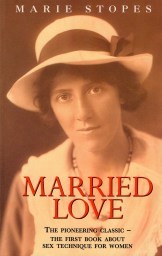 The groundbreaking book, published in 1918
The groundbreaking book, published in 1918So the book concerns the effect this discovery has on what has become a pretty humdrum life for Claudia; three daughters all married and left home; archaeologist husband almost permanently absent oversees; living alone in a house that’s too big for her with nothing to do. Claudia’s life has effectively ground to a halt.
The discovery – her ‘awakening’ – opens her eyes to a world that is in the process of going through massive change: in fashion, ideas, morality and above all, in expectation. Women have the vote (some of them). They are even winning seats in the Parliament. Corsets are passé, skirts are getting shorter, night clubs are filled to the brim with bright young things dancing the Charleston. Claudia has a lot of catching up to do.
It’s an important topic (I think). But it’s not Fifty Shades of Grey. And Amazon won’t let me publicise Claudia, nor will many other outlets. And any other attempts to market the book tend to attract the wrong audience.
Perhaps it’s time for a rethink? Or a new category?
Patsy Trench
March 2021
The post What is an erotic novel? appeared first on .



